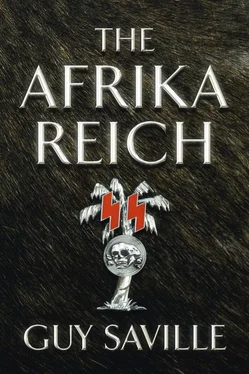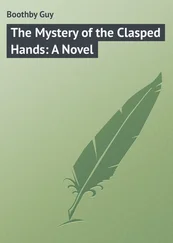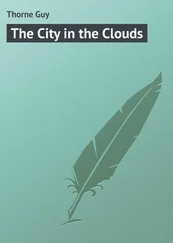In October Britain and Germany came to terms, signing a non-aggression pact and creating the Council of New Europe (the CONE in diplomatic-speak). The occupied countries – France, Belgium, the Netherlands, Denmark and Norway – would be granted their autonomy under newly elected right-wing governments, taking their place alongside Italy, Spain, Portugal, Sweden and Finland. It was also agreed that the Wehrmacht should maintain its foreign bases to ensure the stability of this new community. In the east, Britain promised to remain impartial if ever Germany needed to defend its borders against Soviet aggression. Most of the Dunkirk prisoners were home in time for Christmas. Hitler congratulated the British people on their common sense; sent them a Yuletide tree to stand in Trafalgar Square – a tradition that had continued in the years since.
Other peace accords followed, guaranteeing the two countries’ neutrality towards each other and returning the African colonies Germany had been stripped of by the Versailles Treaty.
The culmination was the Casablanca Conference of 1943 when the continent was divided – Churchill said ‘cleaved’ – between the two powers. Britain would retain its interests in East Africa (the only concession being the former German colony of Tanganyika); Germany would take the west, subsuming the territory of its newly independent European neighbours – one of Hitler’s founding principles for the Council of New Europe. Not all had gone quietly. War raged in Congo for over a year, while the Free French, under General de Gaulle, put up a final stand in Douala, Cameroon, before being driven into the Atlantic by the Afrika Korps.
Since then a decade of peace and prosperity.
When Burton got back to the jeeps Patrick was waiting for him. ‘If Dolan says one more thing I’ll gut him, I swear—’
‘I need you up top. See if you can spot the plane.’
‘I told you already: I’m too old to climb trees.’
‘It’s either you or Dolan.’
The American humphed. ‘Time?’ he asked.
Burton checked his watch again: ‘02:19.’
‘We should be able to hear them by now,’ Patrick said, clambering upwards.
‘I know.’
Patrick disappeared into the foliage. ‘I never did trust Ackerman,’ he called back after him through the leaves. ‘Now the job’s done we’re just an expense.’
Burton stood for a few seconds longer, ear cocked to the sky, then climbed back into the Ziege next to Lapinski.
‘I heard Major Whaler,’ said the driver. ‘What if he’s right?’
Burton sighed. His feet ached in his boots; at least he was wearing socks. ‘ Be not faithless, but believing. ’
‘Eh?’
‘John, forget it. Ackerman will play us straight.’
‘But what if they don’t show?’
‘Then I’m lucky I’ve got you.’
Lapinski gave him a quizzical look.
‘It’s going to be a very long drive back home. Don’t worry, five minutes from now you’ll be bellyaching about the turbulence.’
They fell into silence, Burton listening for the faint hum of propellers to the south. The flight was a regular Central African Airways one that flew freight from Salisbury in Southern Rhodesia to Khartoum each week. No Nazi operator would give the blip on his radar screen a second glance. Or so Ackerman had reassured them.
Lapinksi spoke again. Burton guessed he was jittery. ‘I’m going to teach Elizabeth to drive. Buy her a car. That will impress her folks, don’t you think?’
‘Especially if you buy British.’
‘I wouldn’t think of anything else. A little Austin.’
‘I’m sure they’ll welcome you to the family,’ Burton said, trying not to sound insincere. He knew the driver had only taken the job for the money, trusting a fat wallet to sway the prejudices of his sweetheart’s parents. Poland no longer existed, Warsaw razed to the ground. An ex-corporal from an ex-country wasn’t exactly what they had in mind for their little girl.
‘I hope so, Major. She’s all I ever wanted.’
‘I know what you mean,’ said Burton, thinking of Madeleine. Next moment, he held his finger to his lips: ‘You hear that?’
Lapinski listened, then shook his head.
Burton leaned out of the window, cupped his ear. He was sure he had caught the distant hum of propellers, but now all he could hear was the sound of insects. Das Heimchenchor , his father used to call it. Burton wondered what they were saying to each other, what songs they sang. In this part of the jungle they would be oecanthinae: tree crickets.
At the far end of the runway a fountain of red light erupted. Dolan had lit the first flare.
‘Let’s hope it doesn’t guide the Krauts to us,’ said Lapinski.
Burton didn’t reply, his ears still sifting the soundtrack of the night. When he was a boy Hochburg used to tell him tales about the crickets. How they had citadels hidden in the undergrowth, waged wars like men, bred warriors and princesses. And how one day – if Burton was sehr artig and didn’t disturb him when he was praying with his mother – he’d teach him the crickets’ secret language. Like so many of Hochburg’s promises it never came to anything, but sometimes he would make strange chirping noises; then laugh at him.
Hochburg and his stories.
Burton shifted on his seat, hotter than ever, the SS uniform cloying against his chest; all he wanted to do was rip it off. He thumped the dashboard. ‘Where’s that fucking plane?’
As if to answer him the burr of propellers was suddenly heavy in the sky. How had he missed it? It was coming in from the south-west. Growing louder and more welcome by the second.
Burton and Lapinski abandoned the jeep and ran to the tree line. Dolan was already waiting. There was another flare of light as Vacher lit the second beacon. Burton glimpsed the silhouette of the young soldier as he hurried back towards them. A decade ago a night-time pick-up would have been impossible – even with flares. But Ackerman had supplied the pilots with the same equipment as Patrick. It was cascade tube, state-of-the-art, German manufactured of course.
‘There she is!’ boomed Dolan. He began to sing in Welsh, ‘ Lord, lead me through the wilderness… ’ For once Burton didn’t tell him to keep it down.
The plane was already on its final approach: a Vickers Viscount, its four propellers a grey blur against the sky, wheels low enough to skim the canopy.
The tree above them swayed and rustled and Patrick jumped to the ground, his own night-vision gear still wrapped around his head.
Burton beamed reassurance at him.
‘We got Lebbs,’ said Patrick. His tone conveyed no expression. ‘A whole convoy. At least a dozen vehicles, some with MG48s.’
Burton’s grin vanished. Dolan scowled at Patrick like it was his fault.
‘Are they on our track?’ said Burton. ‘How long?’
Behind them the plane touched down, its wheels groaning as they hit the compacted earth of the runway. Instantly the engines began to power down to give the aircraft enough room to stop.
‘If they didn’t know we were here before, they do now,’ said Patrick. ‘Two minutes tops.’
‘What if they send up a patrol?’ Lapinski had asked the same question a hundred times during the training. ‘We’ll never outrun a jet-fighter.’
‘They can’t shoot down a commercial flight,’ replied Burton for the hundred and first. ‘Not without proof it’s us.’ This time his voice carried less conviction. ‘Two minutes is plenty.’
The Vickers had slowed to a running pace, its rear hatch open. An airman emerged, descending with all the enthusiasm of a swimmer entering crocodile-infested waters. The Vickers trundled on towards the far end of the runway to turn around. Burton could make out the blue CAA logo on its tailfin. The airman beckoned towards them.
Читать дальше












